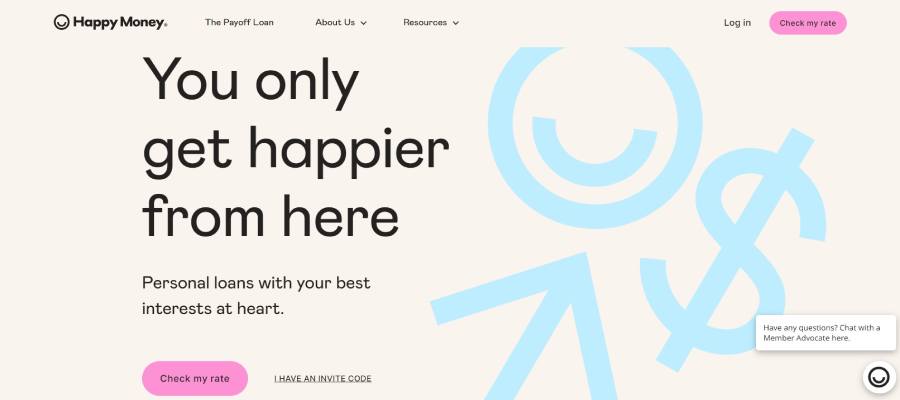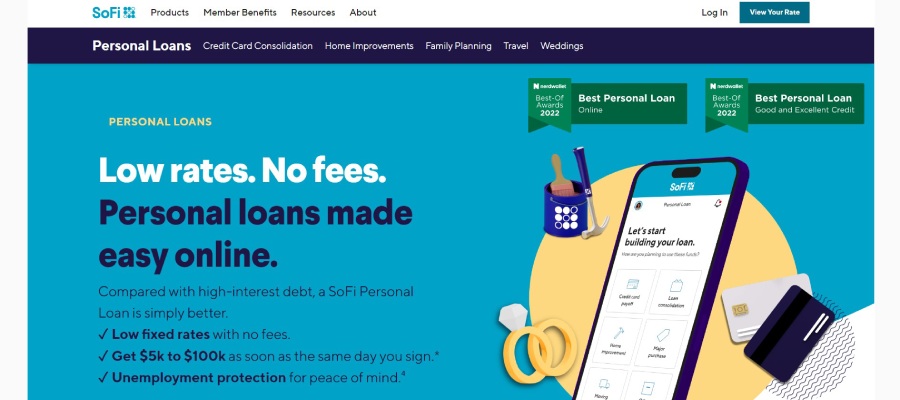Personal loan refinancing is usually an attractive option for borrowers looking to lower their rates and monthly payments or change their personal loan term. However, it’s important to carefully consider all the pros and cons before deciding on a personal loan refinance.
In this guide, we’ve covered everything you need to know about refinancing a personal loan, including the steps to take, the scenarios in which it’s a good idea, and when it’s best to avoid it. We’ve also discussed the impact of refinancing on credit scores and the potential costs involved.
Best Lenders To Refinance Personal Loan
Refinancing your mortgage can save you thousands of dollars in interest costs and provide a more manageable payment plan. Choosing the right company can be overwhelming, so we have researched for you.
Each company listed below has been thoroughly evaluated based on their personal loan rates, customer service, and overall experience. All you have to do is choose the best one for your needs and confidently start your refinancing process. Now, let’s dive into the details and find the perfect fit for you.
| Lender | Credit Score Req. | Repayment Term | Amount |
| LightStream | 660 | 24 to 144 months | $5,000 to $100,000 |
| Happy Money | 640 | 2 to 7 years | $5,000 to $100,000 |
| Wells Fargo | 660 | 12 to 84 months | $3,000 to $100,000 |
| SoFi | 680 | 2 to 7 years | $5,000 to $100,000 |
| Avant | 580 | 24 to 60 months | $2,000 to $35,000 |
LightStream

LightStream is a highly recommended online lender for refinancing a personal loan. It allows borrowers to refinance their existing loans at competitive rates, with loan amounts ranging from $5,000 to $100,000 and terms between 24 to 144 months.
To be eligible for refinancing with LightStream, borrowers must have good to excellent credit (minimum FICO score of 660), sufficient income, and strong credit history. There are no fees or prepayment charges, and the company offers a 0.50% discount for borrowers who enroll in autopsy.
Pros:
- Competitive rates on multiple loans.
- Same-day funding available for qualified borrowers.
- Doesn’t charge origination fee, prepayment charges, etc
Cons:
- High credit requirements may make it difficult for some borrowers to qualify.
- No option to prequalify with good credit scores
Happy Money

Happy Money is a lender offering eligible borrowers great refinancing options. The company provides a range of amounts, from $5,000 to $100,000, with terms between two to seven years.
To be eligible for refinancing with Happy Money, borrowers must have a minimum credit score of 640, an annual income of at least $40,000, and a maximum debt-to-income ratio of 50%.
Pros:
- Personalized credit options based on the borrower’s financial situation
- Transparent application process with clear information on rates and fees
- No prepayment penalties
- Free financial tools and resources to help borrowers improve their financial wellness
- 0.25% rate discount for borrowers who enroll in autopay
Cons:
- Origination fees may apply, ranging from 0.99% to 5.99%
- Limited availability in certain states
- No option to prequalify with good credit scores
Wells Fargo

Wells Fargo is a well-known financial institution offering loan refinancing options to eligible borrowers. The company provides personal loans ranging from $3,000 to $100,000, with 12 to 84 months repayment terms.
To qualify for personal loans refinancing with Wells Fargo, borrowers must have a minimum credit score of 660 and a minimum annual income of $24,000. Borrowers may also be required to provide proof of income and employment.
Pros:
- Competitive rates
- Same-day funding available for qualified borrowers
- Flexible monthly payment terms
- Doesn’t charge origination fee, prepayment penalties, etc
Cons:
- High credit requirements may make it difficult for some borrowers to qualify.
- Limited availability in certain states
- Borrowers must have an existing Wells Fargo account to apply.
SoFi

SoFi is a financial institution that offers personal loan refinancing options to eligible borrowers. The company provides personal loans ranging from $5,000 to $100,000, with two to seven years of repayment terms.
SoFi is known for its member benefits program, which includes career coaching, financial planning services, and discounts on other financial products. Your score should at least be 680 paired with a minimum annual income of $50,000 to qualify for its offers.
Pros:
- More favorable interest rate
- No origination fees or prepayment charges
- Member benefits program offers valuable resources and discounts
- Streamlined online application process
- Same-day funding available for qualified borrowers
Cons:
- High credit requirements may make it difficult for some borrowers to qualify.
- Limited availability in certain states
Read More: Sofi Review
Avant

Avant is a financial institution offering refinancing options to eligible borrowers. The company provides personal loans ranging from $2,000 to $35,000, with 24 to 60 months repayment terms.
One of the unique features of Avant is its fast funding options, with funds deposited into borrowers’ accounts as soon as the next business day. To be eligible for a personal loan refinance options with Avant, borrowers must have a minimum credit score of 580, a minimum annual income of $20,000, and a maximum debt-to-income ratio of 35%.
Pros:
- Fast funding options available for qualified borrowers
- Prequalification process allows borrowers to check their rates without impacting their credit score
- Flexible repayment period
- No prepayment penalties
- Competitive rates
Cons:
- High-interest rates for some borrowers, particularly those with lower credit scores
- Origination fees may apply
- Limited amounts compared to some other lenders
What Refinancing Personal Loan Is
Refinancing a personal loan involves taking out a new credit to pay off an existing loan, typically with less stringent terms or a lower interest rate. The new credit is used to pay off the remaining balance of the current loan, leaving the borrower with a single existing loan to manage.
For borrowers with bad credit, refinancing a personal loan can be an opportunity to secure a more manageable amount with lower interest rates, monthly payments, or longer repayment period.
For example, if someone with bad credit initially took out a personal credit with a high-interest rate of 20% to consolidate their high interest debt, they could opt for an existing personal loan refinance with a new loan balance and a lower interest rate, such as 10%. This would reduce their higher monthly payments and save them money in the long run.
How Refinancing Personal Loan Works
Refinancing a personal loan involves taking out a new credit to pay off an existing loan. The new credit typically has more favorable terms, such as a lower interest rate, longer repayment term, or lower monthly payments.
Once the new credit is approved, the funds are used to pay off the remaining balance on the original loan, leaving the borrower with a single credit to manage.
A good illustration of how refinancing a personal loan works is to imagine that you have a car debt with a high-interest rate of 15%. You have been making payments on time but find that the interest makes it challenging to keep up with the payments.
You decide to do a personal loan refinance, and after shopping around, you find a lender willing to refinance the loan at a lower interest rate of 8%.
Once the new loan is approved, the same lender sends the funds to your current lender, paying off the remaining balance. From then on, you make monthly payments to the same bank (the new lender) at a lower interest rate.
This reduces your monthly repayments, and you can save money on the interest you would have paid and pay off the original debt sooner.
Read Also: Should I Consolidate & Refinance My Student Loans
When To Refinance Personal Loan?
Before deciding to refinance a personal loan, evaluating whether it’s the right decision for your financial situation is essential. Refinancing can save you money on interest and lower your monthly repayments, but it’s not always the best option.
There are specific scenarios where refinancing a personal loan is the best choice. In the following sections, we will discuss the best refinancing companies in the market and when it’s best to refinance personal credit.
Your Credit Improved
Refinancing your credit can be a great option when your credit score improves. With a higher credit score, you may qualify for lower interest rates, but study loan terms carefully, as it can save you money on monthly payment dues and over time.
When you do this with a higher credit score, you can secure a lower interest rate, reducing your monthly payments and the overall cost. You can change the payment term or adjust other terms, saving you money.
An improved credit score can also help you build a better credit history. You can boost your credit score even further by maintaining timely monthly payment streaks on your new loan balance.
Interest Rates Decreased
Refinancing when rates have decreased can be a great option because it can save you money in the long run. Multiple lenders may offer lower interest rates and better terms to attract customers when interest rates drop.
By doing this with a lower interest rate, you can reduce your monthly payments and the overall cost. This can free up your budget, which you can use to pay down debts or save for other financial goals.
You Can Afford Larger Monthly Payments
Refinance loan when you can afford a larger monthly payment can be a great option because it can help you pay off your existing debt more quickly and save money on interest charges.
By refinancing to a shorter loan term with a larger monthly payment, you can reduce the total amount of interest you pay over time. Paying off your debt more quickly can help boost your credit score, which could ease your credit obtainment in the future, especially on unsecured loans.
When Should You Avoid Refinancing Personal Loan?
While refinancing personal credit makes a great option in certain scenarios, there are also situations where users should avoid it.
These scenarios may involve potential drawbacks that could cost the user more money in the long run. Below, we’ll discuss some of these scenarios to help users decide whether refinancing their existing personal loan is the right choice for them.
Too Large Fees Of New Loan
Refinancing involves paying fees like you did when taking out the original one. If the fees on the new loan are too high, it may not be worth refinancing, as the fees outweigh the cost savings. When considering this option, it’s essential to calculate the overall cost of the new loan, including any fees, and compare loan offers with the cost of the original loan.
If the fees on the new loan amount are significantly larger, refinance may need to be clarified. Additionally, it’s important to ensure that the new loan offers better terms, such as a lower interest rate, to make refinancing a wise financial decision.
Prepayment Penalties On Current Personal Loan
When you refinance a personal loan, it’s usually to save on interest, pay off your credit faster, or get a lower monthly payment. However, if your current loan amount has a prepayment penalty, you’ll have to pay a fee if you pay off the existing debt early. This fee can be substantial and negate any savings you might get from refinancing.
For example, let’s say you have a personal loan with a prepayment penalty of $500. If you refinance and pay off the loan early, you’ll have to pay that $500 fee on top of any other costs associated with the new one. This can quickly add up and make refinancing a bad financial move.
Interest Rate Is Higher Than Current Loan
When you refinance a personal loan, it may not be a good option if the interest rate on the new one is higher than the current loan.
The major reason people refinance is to access a more favorable interest rate, which would reduce the total cost of the refinance over time.
If the fixed interest rate on the new one is higher than the current loan, it would make no sense to refinance.
Moreover, refinancing comes with certain costs like origination charges, application fees, and closing costs, which can add up to thousands of dollars. If the interest rate on the new loan is not significantly lower than the original loan, these costs outweigh the savings you would get from the lesser interest rate.
How To Refinance Personal Loan
Depending on your approach, this could have a good or bad impact on your finance. To ensure you follow the correct procedure, below is a step-by-step guide on how to keep you and your lender happy without breaking your neck.
- Check your credit score: Always strive to check your credit reports before applying for refinancing. But it’s not necessarily through hard credit inquiry, which could hurt you. This will give you an idea of the interest rate you might be eligible for and help you make an informed decision.
- Research online lenders: Look for lenders who can refinance a personal loan and compare their rates, origination fee, and other related costs and terms. Make sure to read customer reviews and check their reputation.
- Apply for pre-approval: Apply with a few lenders to get an idea of what rates and terms you qualify for. This will also help you avoid a hard inquiry on your free credit report, which can temporarily lower your score.
- Submit a formal application: Once you’ve found a suitable lender, submit a formal application. You must provide personal and financial information, such as income and employment details.
- Provide necessary documents: The credit union will require you to provide documentation such as proof of income, identification, and current loan information.
- Sign the agreement: Once your application is approved, review the agreement carefully and sign it if you agree to the terms.
- Pay off your old debt: The new lender will pay off your old loan, and you’ll start making payments to the new lender.
- Monitor your bank statements: Make sure to monitor your bank account regularly to ensure that the new loan is being serviced correctly and there are no errors.
Pros And Cons Of Refinancing A Personal Loan
Although it’s been a savior for many borrowers, new loan refinance is not always a good option. So, below are some of the most important merits and demerits of this financial aid to look out for.
Pros:
- Lower rates: When you refinance a personal loan, it could help lower the interest rate, lower monthly payment, and thus allow saving money.
- Consolidation of credit card debt: Refinancing personal loans enables you to consolidate multiple credits into one, simplifying payment and reducing stress.
- Shortening term: You can shorten the length of your term, saving you even more money in the long run.
- Improved credit score: Paying off the existing loan with a new loan and maintaining timely payments could improve your credit score.
- Change the type of credit: You can switch from a variable rate to a fixed rate loan to have more predictable payments.
Cons:
- Additional fees: There may be additional fees associated with deciding to refinance a personal loan, such as application fees, origination fee, and prepayment penalties.
- Impact on credit score: Applying for new loan funds could temporarily negatively impact your credit score.
- Longer repayment period: If you extend the term, you may end up paying more in interest costs over the life of the refinanced loan
Read Also: Best Mortgage Refinance Companies
How Refinancing Your Personal Loan Can Affect Your Credit
Refinancing a new personal loan affects your finances in different ways, either positively or negatively impacting a user’s credit score. But it all depends on your financial situation and how carefully you handle it.
On the positive side, refinancing can lower the user’s monthly payments, making it easier for them to manage their debt and avoid late charges.
Additionally, if the user can secure a lower interest rate through refinancing, they may be able to pay off their debt faster and reduce their overall interest charges. This can improve their credit utilization ratio, a significant factor in determining credit scores.
On the negative side, applying for refinancing can result in a hard inquiry on the user’s credit report, which can temporarily lower their score. Additionally, if the user closes their old loan account, this can negatively impact their credit history and length of credit.
Conclusion
Deciding to refinance a personal loan can be a smart financial move under the right circumstances, as it can offer significant benefits such as lower monthly repayments, reduced fixed interest rates, or a change in the loan term.
However, it’s important to weigh the costs and benefits carefully before proceeding with the refinance loan. Refinancing hurt can occur if the borrower doesn’t fully understand the terms and conditions of the new loan, resulting in higher interest rates, fees, or longer repayment terms.
Hence, it’s essential to understand the potential risks and drawbacks of refinancing a personal loan, such as prepayment penalties, application fees, and appraisal costs. Ultimately, deciding to refinance a personal loan makes sense if it aligns with the borrower’s financial goals and helps them save money in the long run.
Sources Used in Research for the Article:
- Should I refinance, Consumer Financial Protection Bureau, https://files.consumerfinance.gov/f/documents/cfpb_should_i_refinance_handout.pdf
- Your Credit History, Federal Trade Commission, https://consumer.gov/credit-loans-debt/your-credit-history
- What is a credit score, Consumer Financial Protection Bureau, https://www.consumerfinance.gov/ask-cfpb/what-is-a-credit-score-en-315/

